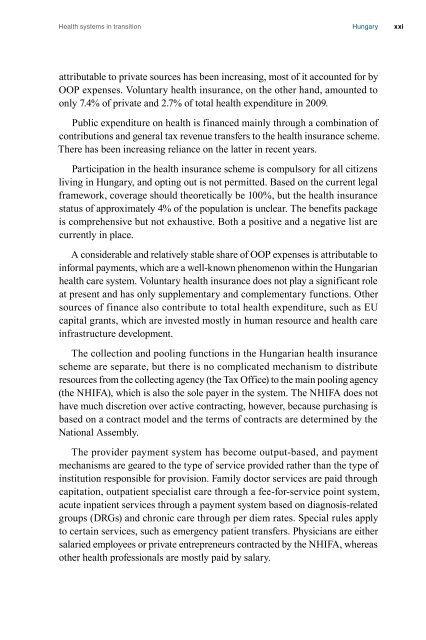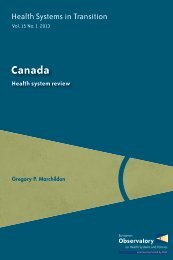Health Systems in Transition - Hungary - World Health Organization ...
Health Systems in Transition - Hungary - World Health Organization ...
Health Systems in Transition - Hungary - World Health Organization ...
Create successful ePaper yourself
Turn your PDF publications into a flip-book with our unique Google optimized e-Paper software.
<strong>Health</strong> systems <strong>in</strong> transition <strong>Hungary</strong> xxi<br />
attributable to private sources has been <strong>in</strong>creas<strong>in</strong>g, most of it accounted for by<br />
OOP expenses. Voluntary health <strong>in</strong>surance, on the other hand, amounted to<br />
only 7.4% of private and 2.7% of total health expenditure <strong>in</strong> 2009.<br />
Public expenditure on health is f<strong>in</strong>anced ma<strong>in</strong>ly through a comb<strong>in</strong>ation of<br />
contributions and general tax revenue transfers to the health <strong>in</strong>surance scheme.<br />
There has been <strong>in</strong>creas<strong>in</strong>g reliance on the latter <strong>in</strong> recent years.<br />
Participation <strong>in</strong> the health <strong>in</strong>surance scheme is compulsory for all citizens<br />
liv<strong>in</strong>g <strong>in</strong> <strong>Hungary</strong>, and opt<strong>in</strong>g out is not permitted. Based on the current legal<br />
framework, coverage should theoretically be 100%, but the health <strong>in</strong>surance<br />
status of approximately 4% of the population is unclear. The benefits package<br />
is comprehensive but not exhaustive. Both a positive and a negative list are<br />
currently <strong>in</strong> place.<br />
A considerable and relatively stable share of OOP expenses is attributable to<br />
<strong>in</strong>formal payments, which are a well-known phenomenon with<strong>in</strong> the Hungarian<br />
health care system. Voluntary health <strong>in</strong>surance does not play a significant role<br />
at present and has only supplementary and complementary functions. Other<br />
sources of f<strong>in</strong>ance also contribute to total health expenditure, such as EU<br />
capital grants, which are <strong>in</strong>vested mostly <strong>in</strong> human resource and health care<br />
<strong>in</strong>frastructure development.<br />
The collection and pool<strong>in</strong>g functions <strong>in</strong> the Hungarian health <strong>in</strong>surance<br />
scheme are separate, but there is no complicated mechanism to distribute<br />
resources from the collect<strong>in</strong>g agency (the Tax Office) to the ma<strong>in</strong> pool<strong>in</strong>g agency<br />
(the NHIFA), which is also the sole payer <strong>in</strong> the system. The NHIFA does not<br />
have much discretion over active contract<strong>in</strong>g, however, because purchas<strong>in</strong>g is<br />
based on a contract model and the terms of contracts are determ<strong>in</strong>ed by the<br />
National Assembly.<br />
The provider payment system has become output-based, and payment<br />
mechanisms are geared to the type of service provided rather than the type of<br />
<strong>in</strong>stitution responsible for provision. Family doctor services are paid through<br />
capitation, outpatient specialist care through a fee-for-service po<strong>in</strong>t system,<br />
acute <strong>in</strong>patient services through a payment system based on diagnosis-related<br />
groups (DRGs) and chronic care through per diem rates. Special rules apply<br />
to certa<strong>in</strong> services, such as emergency patient transfers. Physicians are either<br />
salaried employees or private entrepreneurs contracted by the NHIFA, whereas<br />
other health professionals are mostly paid by salary.
















